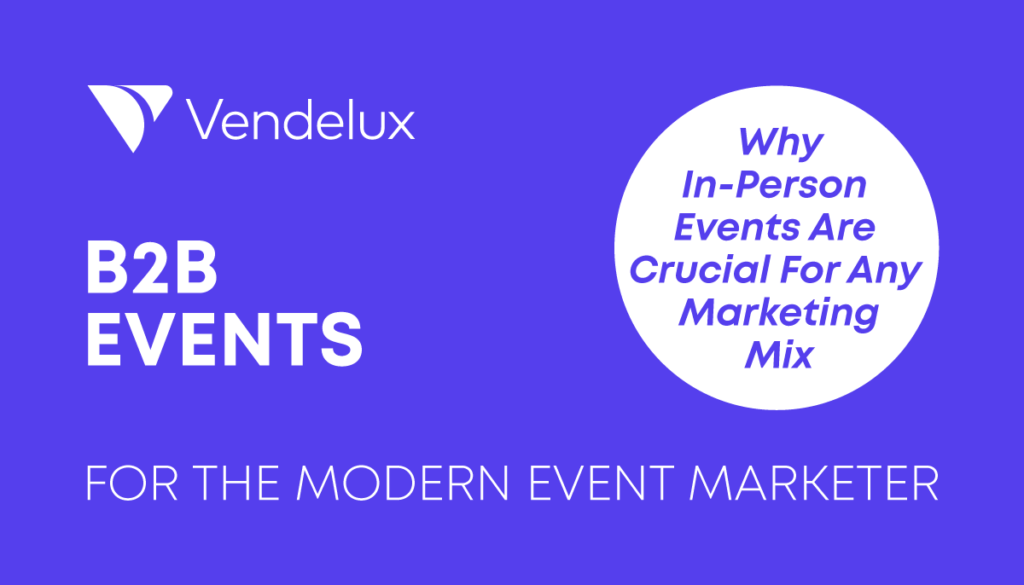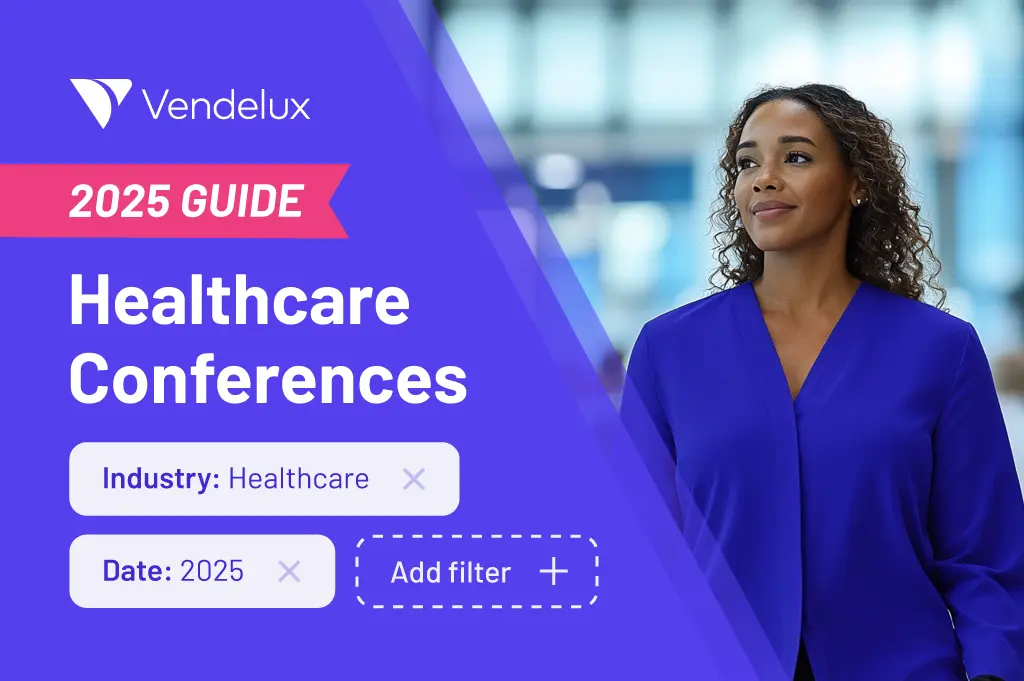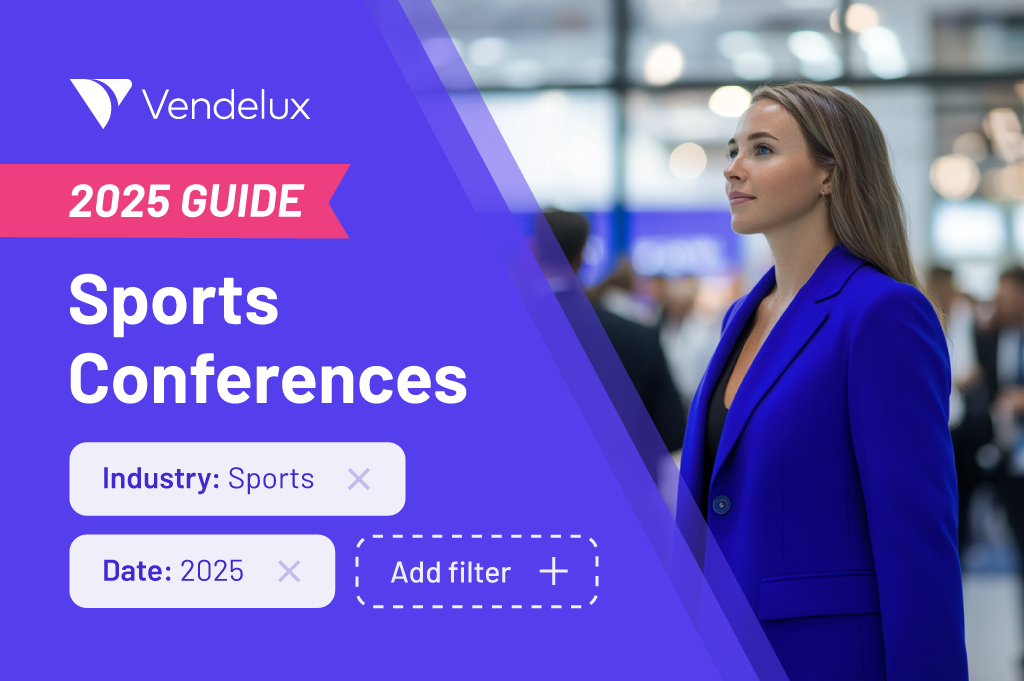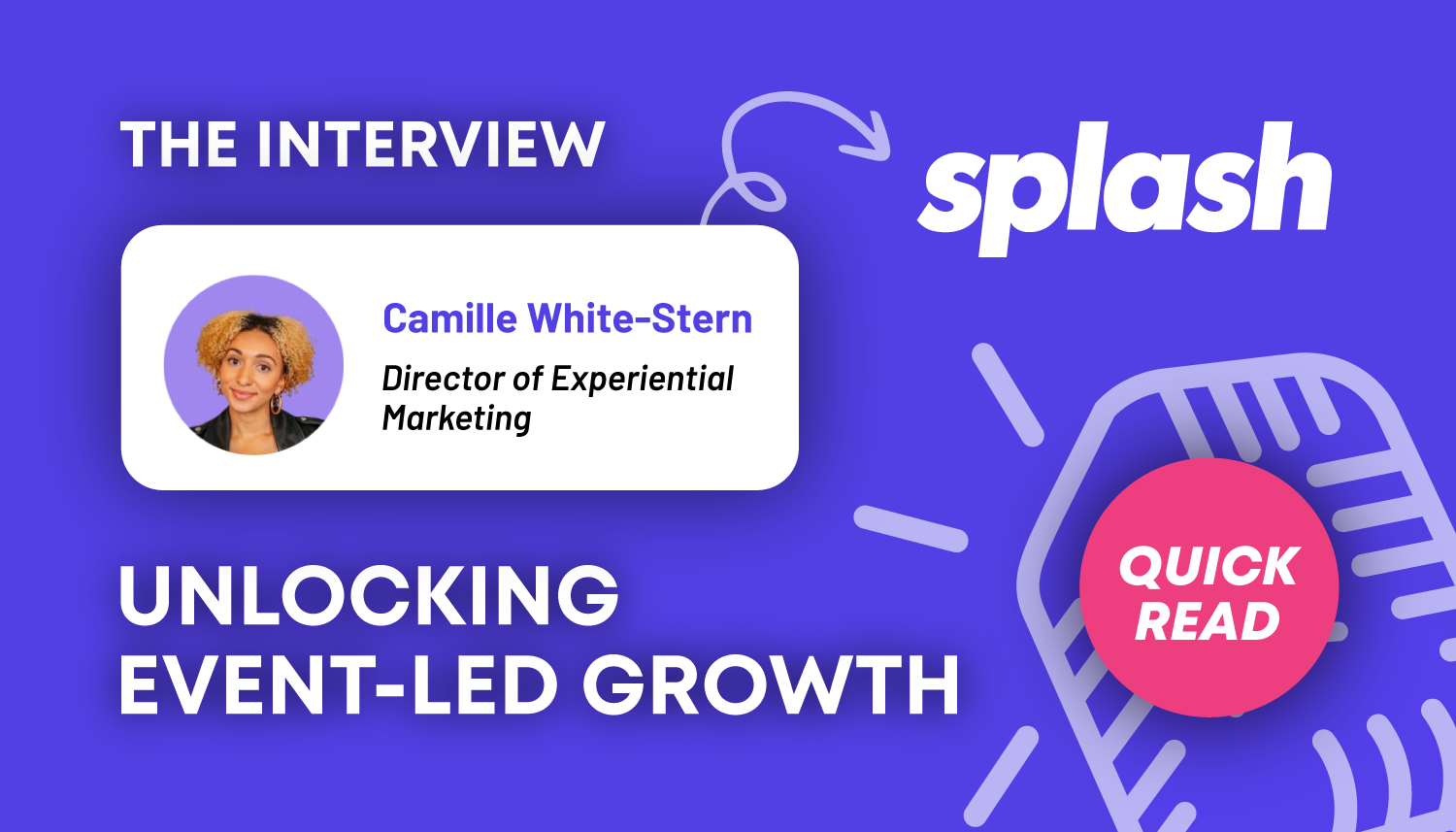For B2B event marketers, integrating in-person events into their marketing mix is a must – and it’s a channel thats usually overlooked. These events are not just about networking; they’re a dynamic platform for lead generation, building brand awareness, and fostering meaningful connections with the target audience. Unlike virtual or hybrid events, in-person events offer a unique opportunity for direct engagement, making them indispensable for any comprehensive event marketing strategy.
These gatherings are more than just networking opportunities; they’re a deep dive into the needs and interests of potential clients and industry professionals. By participating in trade shows, VIP dinners, or invite-only events, businesses can gather valuable insights, enhancing their marketing efforts and product development to align with their audience’s expectations.
Future events, can be strategically planned to complement other marketing channels like digital marketing and social media campaigns – but it’s not necessary. Going into 2024 we will see more pipeline generated specifically from event marketing as a channel.
What is a B2B Event?
A B2B (Business-to-Business) event is a specialized forum where companies focus on building and enhancing relationships with other businesses within the same industry or related sectors. These gatherings are pivotal for companies aiming to showcase their products and services, increase brand awareness, and engage with potential clients and other business owners. The primary audience at a B2B event encompasses business owners, executives, and decision-makers, all seeking to form new partnerships, broaden their industry knowledge, and discover innovative business solutions.
The evolution of B2B events has led to a diverse range of formats, accommodating various event goals and marketing efforts. These include:
- Trade Shows and Conferences: Serving as a cornerstone of the events industry, trade shows and conferences bring together vast numbers of businesses under one roof, providing a comprehensive platform for showcasing products, learning about industry advancements, and engaging in high-level networking.
- Seminars and Workshops: These are educational events focused on providing attendees with new skills, knowledge, or insights about specific industry topics, often featuring expert speakers and interactive sessions.
- Networking Events: These gatherings are less formal and are designed specifically for building relationships, allowing event attendees to connect with peers, potential clients, and industry leaders in a more relaxed setting.
- Roundtable Discussions: These involve smaller, more focused group discussions on niche topics relevant to the specific industry, fostering deep dives into subject matters and more intimate networking opportunities.
- Virtual or Hybrid Events: The rise of digital technology has given way to virtual and hybrid events, which combine elements of online events and in-person interactions. These formats have become essential in today’s landscape, allowing broader participation from global attendees and offering innovative ways for event marketers to engage their audience, distribute event content, and generate leads through digital platforms.
- Event Apps and Digital Marketing: Utilizing event apps and online marketing channels has become a crucial part of event strategy, helping to enhance attendee experience, facilitate networking, and manage event content efficiently.
Each of these event types plays a crucial role in a company’s lead generation efforts and marketing event strategies. They provide platforms for businesses to create memorable experiences, engage with their target audience, and generate buzz, especially during product launch events. Furthermore, managing the event budget effectively is vital to ensure the success and sustainability of these events.
Benefits of B2B Event Marketing
B2B event marketing is a multifaceted strategy that brings a multitude of benefits, crucial for the growth and success of businesses in various industries. These benefits encompass a wide range of objectives, from networking to lead generation, and play a pivotal role in a company’s overall marketing efforts.
Networking and Relationship Building
- In-Person: B2B events, including in-person events and hybrid events, offer invaluable opportunities for networking. They provide a platform for businesses to meet with industry peers, potential clients, and thought leaders, facilitating the building of long-term professional relationships.
- Diverse Event Formats: Whether it’s a trade show, a networking event, or an online event, each format caters to different aspects of relationship building, allowing companies to connect with people attend events from various sectors and levels.
Lead Generation and Sales Opportunities
- Targeting the Right Audience: B2B events are highly effective as a lead generation tool because they attract event attendees who are genuinely interested in the products or services offered. This targeted approach ensures that the leads generated are of high quality and relevance.
- Engaging Potential Clients: These events provide a unique opportunity for businesses to engage directly with current and potential clients, facilitating discussions that can lead to sales opportunities and collaborative ventures.
Brand Visibility and Awareness
- Enhancing Brand Recall: Participating in B2B events helps businesses to increase brand awareness and stand out in their specific industry. These events are platforms for showcasing marketing collateral, which helps in creating brand awareness and enhancing brand recall among attendees.
- Utilizing Event Marketing Collateral: Through thoughtful event content and marketing collateral, businesses can leave a lasting impression on event attendees, further increasing their brand’s visibility.
Market Insights and Trends
- Gathering Industry-Specific Insights: B2B events are excellent sources for acquiring insights about market trends, customer preferences, and competitive strategies within a specific industry. This information is crucial for businesses to stay ahead and make informed decisions.
Product Demonstrations and Feedback
- Showcasing Products and Services: Businesses have the opportunity to showcase their offerings through product launch events and demonstrations, receiving immediate feedback from attendees. This feedback is invaluable for product development and improvement.
Content and Thought Leadership
- Establishing Industry Authority: By participating in panel discussions, giving presentations, or conducting workshops, businesses can establish themselves as thought leaders. This positions them as authoritative voices in their industry, aiding in building trust and credibility.
Efficient Budget Management and Event Strategy
- Strategic Planning and Budgeting: Successful B2B event marketing also involves careful event strategy planning and efficient management of the event budget. Event planners and marketing teams must ensure that the costs are aligned with the anticipated returns, such as lead generation, brand awareness, and networking opportunities.
Creating Memorable Experiences
- Engaging and Memorable Events: The goal of every B2B event is to create memorable experiences for attendees. Engaging events not only facilitate networking and business opportunities but also ensure that the event and the brand are remembered long after the event has concluded.
Qualities of a Successful B2B Event
To orchestrate a successful B2B event, it is essential to integrate a multitude of key elements into the event’s structure. These elements span from content creation to marketing strategies, each playing a critical role in the overall success of the event.
Relevant and Targeted Content
- Addressing Industry-Specific Needs: The event should deliver content that resonates with the challenges and trends of the particular industry it targets. This involves curating sessions and discussions that are directly relevant to the event attendees, often involving expert insights and case studies.
- Customized for Various Formats: Whether it’s a virtual or hybrid event or an in-person event, the content should be tailored to fit the format, ensuring it engages the audience effectively.
Well-Defined Event Objectives
- Clear Goals and Outcomes: The event should have well-articulated objectives, whether they are related to lead generation, networking opportunities, or enhancing brand recognition. These goals guide the event strategy and help in measuring event success.
Engaging and Interactive Format
- Encouraging Active Participation: To make the event more engaging, formats such as Q&A sessions, interactive workshops, and networking events should be incorporated. This not only enhances the experience for attendees but also fosters connections among people from the same industry.
- Use of Digital Tools: Incorporating digital marketing channels and event apps can make the event more interactive, especially for online events and hybrid events.
Diverse and High-Quality Attendees
- Attracting the Right Audience: Successful events draw in a diverse group of high-quality attendees, including decision-makers and influencers from multiple locations. This diversity enriches the event, creating valuable networking and business opportunities.
Effective Promotion and Marketing
- Leveraging Multiple Channels: Utilizing various digital marketing channels, including social media campaigns and email marketing, is crucial to reach the intended audience. Marketing teams play a pivotal role in this process, ensuring that the event resonates with potential clients and aligns with the overall marketing strategy of the organization.
- Brand Awareness: Effective promotion also helps in creating brand awareness, a key objective for many B2B events, especially in trade shows and invite-only events.
Seamless Organization and Execution
- Attention to Detail: From meticulous planning to flawless execution, every aspect of the event, including logistics, registration, and venue selection, should be handled with precision. Event planners are crucial in ensuring that physical events and hybrid events run smoothly.
Measurable Success Metrics
- Tracking and Analysis: Implementing tools to measure the event’s success is essential. Metrics such as attendee feedback, lead generation figures, and overall engagement levels provide insights into the event’s impact and guide future marketing efforts and event strategies.
What is a Marketing Mix?
The Marketing Mix is a framework for understanding how products are marketed. It consists of four pillars: product, price, place, and promotion. Each pillar has its own purpose in helping customers choose which product/service to buy.
The 4Ps Of the Marketing Mix
The 4Ps of marketing is a model that outlines the four basic pillars of any top-level marketing strategy. It’s also something that marketers always come back to when releasing new products, launching in new markets or engaging in new marketing activities.
Product – What your product or service is
The first element of the marketing mix is the product itself. What do you sell? Is it a physical good or service and how does it provide a solution for your customer?
Price – How much your product or service is
The second pillar of the marketing mix is price; what you charge for your product or service. Do you have a set price or are there different pricing plans available?
Place – Where you will sell your product or service
Where you promote your product. Where do your target audience go to find information about or buy B2B products like yours? Where are they most likely to buy?
Promotion – Where and how you will promote it to get it noticed
How do you reach your customers to tell them about your B2B product? For example: trade shows, industry conferences, social media marketing, word of mouth, TV advertising etc. But what strategies do you use to promote your product to the right customer so they are likely to purchase?
How In-Person Events Are Important to the Marketing Mix
Product
Gain Instant Feedback
In-person events such as trade shows are a great opportunity to showcase your product or service to your target audience, and gain instant feedback. You can hear directly from customers about what their pain points are, how your product can be a solution and how it can be improved further with new features.
Get Insight into B2B Customer Behavior
By attending in-person events with potential customers and competitors in the same room, marketers have greater insight into customer behavior. Allowing you to understand what your customers need and how they respond to different messages. For example, if you realize that the rest of the industry uses a different term to describe something your product does, you can alter how you sell it to keep ahead of trends.
Price
Ensure Your Product is Priced Correctly for your Target Audience
Marketers don’t necessarily influence the price of the product or service. However, for B2B companies, competitively pricing your product can be difficult when pricing isn’t always laid out on the company website, or the selling isn’t done online. By attending in-person events you can make sure your pricing matches up to the kind of customer you want to receive and how you want your company to be perceived.
They Drive B2B Lead Generation
In-person events help you build relationships with your customers. You can use these connections to develop new business opportunities and strengthen existing ones. Whilst this can still be done online, people do buy from people and where people can miss an email campaign or a LinkedIn ad, in-person events put you right in front of them.
The B2B sales cycle tends to be longer than B2C or DTC. Depending on what you’re selling, research shows it can be anywhere from three to nine months long, with the average being six to nine months. Because of this, building strong connections with B2B prospects who turn into leads is even more important, making in-person events crucial to the marketing strategy.
Place
Putting Your B2B Product In Front of the Right People
In-person events are the only area of marketing that can guarantee that you speak directly to the right target audience. But how can you be so sure your target audience will be attending a B2B event? We’ve got just the ticket.
Vendelux is an event intelligence platform that gives you access to a database with detailed information of attendees of 30,000+ B2B events around the world. With Fusion, for the first time ever, event marketers can accurately forecast which sponsors and attendees will be at upcoming events, trade shows and conferences worldwide., so you can make sure you attend the in-person events your prospects do. Meaning you can set up meetings for the day of the event, rather than chasing leads after the fact.
Promotion
They Improve Brand Awareness for B2B Companies
In-person events help build brand awareness by providing a unique opportunity to interact with your audience. This interaction allows you to understand what your audience wants and how they feel about your company. It’s also a chance to show off your product or service in a new light.
NB: It’s important to send the right team members to the right events as they act as the face of the brand.
They Build IRL Relationships That Can Develop Into Long-Term Engagements
People love interacting with people in real life (IRL) and the depth of conversation that can be had in-person is where virtual events lack. This is why thought leadership and personal branding in B2B companies works so well.
But the interaction at in-person events doesn’t stop at the event. Where previous attempts at emailing or connecting with prospects on LinkedIn might have failed, once they’ve met you in person (as long as your B2B sales team have left a good impression) potential customers are more likely to connect on LinkedIn, follow your B2B company’s page and therefore engage with your other marketing touchpoints. Meaning that when they are in the position to buy a product like yours, your brand is already top of mind as a choice.
In-Person Events Strengthen B2B Marketing Strategies
In-person events hold an irreplaceable position in the B2B marketing mix, particularly for event marketing strategies targeting industry professionals. B2B prospects, often well-versed in marketing tactics, require more personalized approaches. Real-life interactions at networking events, trade shows, or even VIP dinners offer an unparalleled opportunity to establish the kind of relationships that drive quality lead generation.
The advantage of in-person interactions in B2B event marketing is unmistakable. When representatives meet face-to-face, it not only enhances brand recognition but also solidifies business relationships in a way that virtual events and hybrid events struggle to replicate. These physical events provide a platform for businesses to stand out from competitors, moving beyond the constraints of a digital screen.
Moreover, in-person events are essential for engaging with the target audience across multiple locations, fostering attendee engagement, and creating memorable experiences that resonate with potential clients. They are a vital tool for generating leads, building brand awareness, and contributing significantly to the overall marketing strategy of a company.
In this context, the success of an event depends on effectively aligning it with the event marketing strategy and the broader marketing efforts. By leveraging in-person events as a key marketing channel, businesses can better meet their event goals and key performance indicators, ensuring continual business growth and customer retention. This approach not only generates buzz around business offerings but also opens doors to new business opportunities and strengthens sales pipeline generation.
If you want more tips for building a successful event marketing strategy, click here. To start your event attendance plan right away, start searching!




